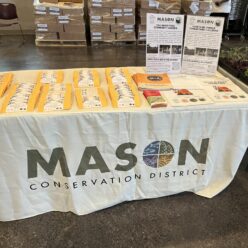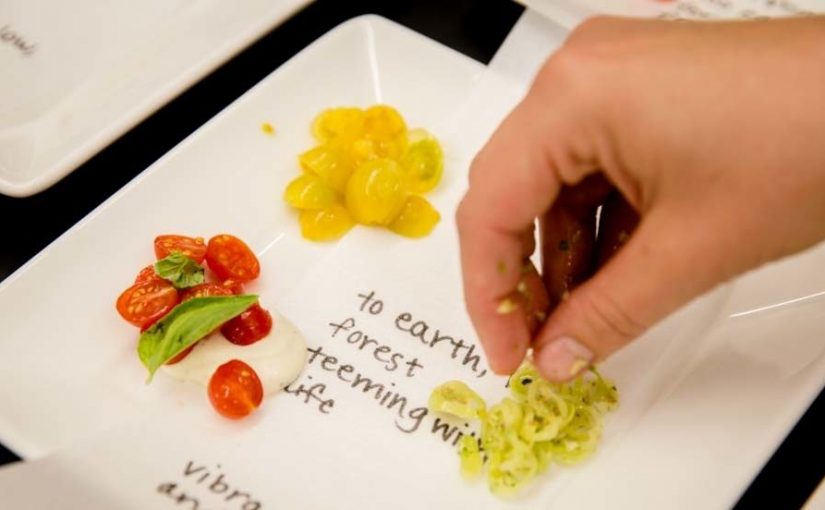Welcome to my internship with the Mason Conservation District, Spring ’24!

After taking multiple Evergreen programs based on our food system, Native and Black agrarian traditions and farming practices, I thought it was time to get out in the field and see how capable I was putting action to use. Learning to harness community agriculture and localized farming, while honoring cultural relations and accessibility. Luckily I found Nick and his crew from the Mason Conservation District at the Evergreen spring internship fair! Nick introduced me to the two different internship opportunities, one being about environmental education and the other titled ‘Community ag. intern’. This was the community ag description:
Mason Conservation District seeks assistance to support the Farms in Translation – Urban and Community Food Systems Grant Program, with the goal to address food insecurity, climate & environmental justice concerns, and mitigate natural resource concerns. Interns will steward community food spaces and assist district staff in rehabilitating community garden spaces to make them more accessible to underserved communities. Sites include but are not limited to Callanan Park Community Garden, Civic Center Pollinator Food Forest, and the soon to be implemented Shelton Veterans Village Garden. The Evergreen Intern will help facilitate the Farms to Food Pantry grant program which provides payments to farms for produce destined for food pantries, with a special emphasis on foods of cultural significance. MCD Gleaning Program and assist in connecting local agricultural producers to food banks, assist district staff in workshops and educational programs.
Mason County, Washington’s only incorporated city, Shelton, as well as its residents, are served by the Mason Conservation District. The agricultural and natural resource sectors have historically dominated the economies of Mason County and the City of Shelton. However, those industries are no longer the main local employment sectors; instead, it is now the government, retail sales, hospitality, and service sectors. These jobs typically come with lower salaries. The community as a whole is currently experiencing economic stress, and for more than 20 years, Shelton’s population has had a higher percentage of families living in poverty than the average for the state. Despite these challenges, the county has kept up a consistent farming tradition for more than 160 years, even though the farmers and their crops have changed over time. The number of farmers between 25 and 34 has increased by more than 100% over the last 20 years, indicating that the agricultural community in Mason County is growing.
I was excited to have the opportunity to be part of a community outside of Olympia, focusing on more rural food accessibility, similar to the environment of where I was raised in Southern Vermont.
Cover letter:
Mason Conservation District,
I am excited to be applying for the Community Agriculture, localized foods, and improved access internship. As an Evergreen student, my focus throughout the last three years has been dedicated to learning how our current food system can be reshaped through the practice of ecological farming and community food hub/networks all while deepening our understanding on the importance of soil health and biodiversity working to establish the framework for urban and community shaped agriculture. It is my foundational belief that soil health needs to be directly equated to human health. This can be achieved through the exchange of resources and community supported agriculture, we should aim to eliminate industrial farming and mono-crops to soon bring back nourishment to our people and land, just how nature intended.
While most programs I have taken have been based in farming practicum along with the issues around food insecurity, I have also participated in a few Native pathway classes about tribal food sovereignty and policy, as well as American Indian Philosophy, which has pushed my understanding on Native principles and values in relation to community and land. Learning from Indigenous Stewarts as well as historical figures in black agrarian and cooperative traditions, such as W.E.B DuBois and Fannie Lou Hamer have inspired my mission to rehabilitate community spaces that are without a means of clean food production by neglectful urban planning established through systematic racism.
In terms of work outside of Evergreen, I have spent the last few years working on different small scale, organic farms in different regions of the country through (WWOOF), this has taught me about the different kinds of motivations local farmers share in supporting their community with clean product, along with how markets, CSAs and retreats are typically organized.
For this position I am hoping to use this opportunity to gain Evergreen Credit through an ILC, working up to 20 hours a week for 10 credits- the days and times as of now are completely flexible. Through working with the CCAS, I hope to gain more experience learning from the Shelton Community, facilitating the farm to food pantry grant program, providing more connections to supply food banks with nutrient dense produce. I also hope to collaborate with peers on different strategies of accessing community needs and planning what different versions of sustainable agriculture through community and urban spaces can look like. I am excited to have the opportunity to become more connected and learn from the Mason Conservation District up close, this position aligns perfectly with how I’d like to make a difference with my future, and further participate in regenerative agriculture and planning.
Thank you for the consideration,
Alex Connor
As one may see, I pulled a lot of material from Land-Based-Learning, Thank youu!!
After a few weeks of back and forth interviews, and deciding my spring schedule, I was offered the position, along with Sam (the education intern).
This position is funded through the CCAS (The Center for Climate Action and Accessibility)- the MCD reached out to Evergreen in hopes of getting a few interns, along with the one Americorps (yearlong) intern to assist in some of the fields they are trying to re-establish with grants such as the ‘Farms in Translation’, and new proposed ‘Urban and Community food systems program’. The CCAS has been coordinating meetings with all the ‘externs-interns’ going through their program to check in about what kind of work/workloads we are contributing to, and if it’s sustainable for their program to continue working with these organizations. So far, the other ‘externs’ are doing similar to work; outreach, organizing, and working in the field. It is nice to take a breather and connect to others that are also, for the first time in an internship position, (even though the CD has a ‘lax environment).

